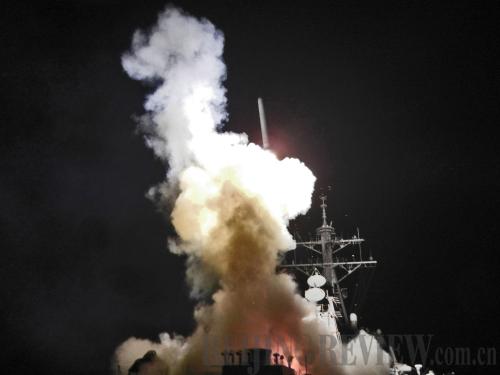|
 |
|
BLASTING OFF: A U.S. destroyer launches cruise missiles toward Libya from the Mediterranean on March 19 (XINHUA/AFP) |

The UN Security Council passed Resolution 1973 on March 17, imposing a no-fly zone over Libya and authorizing "all necessary measures" to protect civilians there. Two days later, coalition forces from countries including France, the United States and Britain commenced sea and air strikes against Libya's air defense network. These were followed by attacks against Libyan leader Muammar Gaddafi to support opposition forces. Although anti-government forces now hold key cities in east Libya, Gaddafi's army has not been completely destroyed.
This military action is the third—Afghanistan and Iraq being the first and second—the United States has launched in the Middle East since 2001. The show of force was Washington's response to the recent upheaval in the Arab world and Libya's domestic turmoil. But the United States has adopted a strategy of operating from behind a curtain with limited involvement in Libyan affairs.
Joint strikes
After protesters took up arms against Gaddafi in February, Washington counted on driving the Libyan leader from power through sanctions and support for the opposition. These measures didn't work as expected. By mid-March, U.S. policymakers who had previously favored a no-fly zone determined that such a measure wouldn't be enough to prevent Gaddafi from retaking cities lost to rebels. Military action would be necessary.
While pushing for a UN resolution establishing a no-fly zone over Libya, the United States made plans for military operations and deployed troops. Although Gaddafi declared a ceasefire after the resolution was passed, he did not stop his siege of Benghazi, a rebel stronghold. Then, the United States and France began launching military strikes on March 19.
Washington's main goal was to prevent Gaddafi's forces from regaining control of Benghazi and crushing the rebels. Further, it wanted to topple the Gaddafi regime. But the United States wished to maintain a flexible, non-committed role due to its experience in Afghanistan and Iraq and the costs associated with military action. In the beginning, the United States commanded coalition forces to enforce the no-fly zone and conduct air strikes in Libya. On March 25, it started to transfer command of operations to NATO.
France, the first country to launch air strikes, acted driven by its impulse to protect its traditional position and interests in North Africa. Since Libya falls under France's traditional sphere of influence, the European power has huge economic and political interests in the North African country. In 2007, French President Nicolas Sarkozy proposed the strategy of restoring French influence in Africa. France also suggested establishing a Mediterranean Union to regain European and French influence. Gaddafi, however, rejected the idea of a Mediterranean Union, so it's no surprise that France is supporting the Libyan opposition.
Since Paris believed Gaddafi would soon be removed from power, it quickly recognized the legitimacy of the opposition-led Libyan National Council. Gaddafi not only held out against protests, but also effectively pushed back anti-government forces. If Gaddafi were to regain control over all of Libya, French interests would be seriously weakened. This left France no choice but to take military action to overthrow Gaddafi.
Besides, with elections scheduled for next year, and the ruling party currently holding a low approval rating, Sarkozy hoped to get more votes for his party through a military victory.
A controversial move
In the past, Western powers customarily resorted to military force to maintain their interests, values and supremacy in the Middle East. But times have changed. Clearly, the West failed to understand the message behind the recent social movements in the Arab world.
The movements across the Arab world that started in early 2011 were driven by people's desire for change. They wished to reform the old political system to have more democratic rights and greater self-determination. Arabs demanded change not only at home, but also in regional affairs. They hoped to do away with the shame of previously having no voice in regional affairs, while calling for democracy in international relations and rejecting foreign interference and military intervention.
Ironically, while requiring other countries to follow democratic principles when dealing with domestic issues, Western powers do not follow similar principles in international affairs. They still believe in hegemony and the use of military force in international relations. Moreover, they take it for granted that most Arabs would voluntarily support the West as they strive for democracy.
In fact, an awakened Arab world, with a strong sense of democracy and independence, will not support Western hegemony. Only authoritarian regimes lacking domestic support tend to look to the West. If Western powers succeed in sponsoring new pro-West regimes in the Middle East, they are unlikely to cooperate with the West the way old ones did.
In the West, a consensus has yet to be established on the military intervention. U.S. lawmakers questioned the move, saying President Barack Obama launched military operations without Congressional authorization. Germany abstained from the vote on UN Security Council Resolution 1973. It also said it would not join NATO's arms embargo against Libya. The only Muslim NATO member, Turkey, objected to the intervention. It pointed out the action was beyond UN authorization. Concerning the United States' transfer of military command, NATO as well as EU members weren't on the same page.
| 